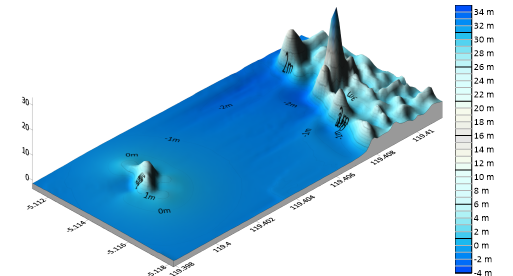Analysis Of The Installation Of Subsea Pipelines To Support The Need For Clean Water In Supporting Tourism Development On Kayangan Island
Main Article Content
Abstract
Inclusive access to water is very important for the tourism sector to maintain a good reputation among tourists and the social license of the local community to operate. While all stakeholders or stakeholders expect the success of tourism which contributes to economic improvement, community welfare, human resource development, and improvement of public health and the environment, tourism activities on Kayangan Island need clean water for their development. Considering that the island is one of the favourite tourist destinations and is growing quite rapidly at this time, there is no effective source of clean water available on the island. Therefore, it can be attempted to provide clean water by using subsea pipes sourced from PDAM Makassar. According to observations from various aspects, the pipe will cross the ocean with a span of ±1500 meters by flowing water with a discharge of 10 lt/s using HDPE pipes with a diameter of 140mm PE100, PN 16 according to SNI standards. For a fairly good security system, the jet pump and the pipe will be tied to a 110 mm diameter stainless steel sling bridge. In addition, at every 6 meters distance, the pipe bridge slings are fitted with ballast loads with hanging slings. In this study, the installation of subsea pipelines requires a variety of supporting equipment and also a complicated implementation, but it is can be carried out considering this needs to be done to support the need for clean water on Kayangan Island to support tourism development.
Article Details

This work is licensed under a Creative Commons Attribution 4.0 International License.
References
A. A. Firucha, Wahyudi, And K. Sambodho, “Risk Assessment Of The Pertagas East Java Gas Pipeline (Ejgp) Due To Soil Liquefaction Due To Earthquake,” Its Engineering Journal, Vol.1, No.1, Pp. G143-G148, 2012.
A. Husen, N. Cholis, And A. N. Setiadi, “Analysis Of Pipe Voltage In Geothermal Pipe Installation Systems In Project X,” Bina Teknika, Vol.14, No.1, Pp. 63-77, 2018.
A. Rasyid. J, Nurjannah. N, A. I. Burhanuddin, And M. Hatta, “Oceanographic Characters Of Makassar Waters Related To Potential Zones For Fishing For Small Pelagic Fish In The East Season,” Perennial, Vol.1, No.1, 2014.
B. Yang, D. S. Jeng, F. P. Gao, And Y. X. Wu, “Forces Acting On The Seabed Around A Pipeline In Unidirectional Ocean Currents,” The Open Civil Engineering Journal, Vol.2, No.1, 2008.
Ministry Of Public Works, Regulation Of The Minister Of Public Works Number: 18/Prt/M/2007 Concerning Implementation Of Drinking Water Supply System Development.
F. Van Den Abeele, And J. Vande Voorde, “Stability Of Offshore Pipelines Close To The Seabed,” In Proceedings Of The 6th Pipeline Technology Conference, Hannover, Germany, 2011.
G. Gumbira, “Application Of Multibeam Sonar Instruments In Subsea Pipeline Laying Activities (Examples Of Study Of The Waters Of Ballooning),” 2011.
L. King, J. Leggoe, And L. Cheng, “Hydrodynamic Forces On Subsea Pipes Due To Orbital Wave Effects,” Doctoral Dissertation, Honours Thesis, University Of Western Australia, 2011.
M. A. A. Masrukhin, D. N. Sugianto, And A. Satriadi, “Studi Batimetri Dan Morfologi Dasar Laut Dalam Penentuan Jalur Peletakan Pipa Bawah Laut (Study Of Bathymetry And Seafloor Morphology In Determining The Laying Path Of The Subsea Pipeline (Prohibited Waters - Maribaya, Tegal Regency),” Journal Of Oceanography, Vol.3, No.1, Pp. 94-104, Jan 2014.
M. F. Khalil, S. Z. Kassab, I. G. Adam, And A. M. Samaha, “Prediction Of Lift And Drag Coefficients On Stationary Capsule In Pipeline,” Cfd Letters, Vol.1, No.1, Pp. 15-28, 2009.
M. Suarda, And I. G. K. Dwijana, “.Study On Installation Of Floating Water Pipes In Seawater To Support Tourism Development In Nusa Ceningan And Lembongan,” Journal Of Energy And Manufacturing, Vol.13, No.1, Pp. 15-21, 2020.
Plastics Pipe Institute, Handbook Of Polyethylene Pipe, 2009.
N. Azisah, D. Paroka, dan W. Wahyuddin, “Analisa Penempatan Dan Kebutuhan Proteksi Katodik Pada Sistem Pipa Gas Bawah Laut Offshore Dari Pulau Pemping Ke Tanjung Uncang Batam”, zonalaut, vol. 1, no. 3, hlm. 57-63, Nov 2020..
T. Arifin, Y. Yulius, And M. F. A. Ismail, ” Conditions Of Tidal Currents In The Coastal Waters Of Makassar, South Sulawesi,” Depik, Vol.1, No.3, 2012.
N. Azisah, D. Paroka, and W. Wahyuddin, “Placement And Needs Analysis Cathodic Protection System On Offshore Subsea Gas Pipeline From Pemping Island to Tanjung Uncang Batam”, zonalaut, vol. 1, no. 3, pp. 57-63, Nov. 2020.
W. Hardi, Dan T. Suyono, “Technique Of Installing Underwater Drinking Water Pipes With The Tt Method From Tidore Island To Maitara Island,” In Seminar Master Ppns, Vol.1, No.1, Pp. 47-52, 2016.

